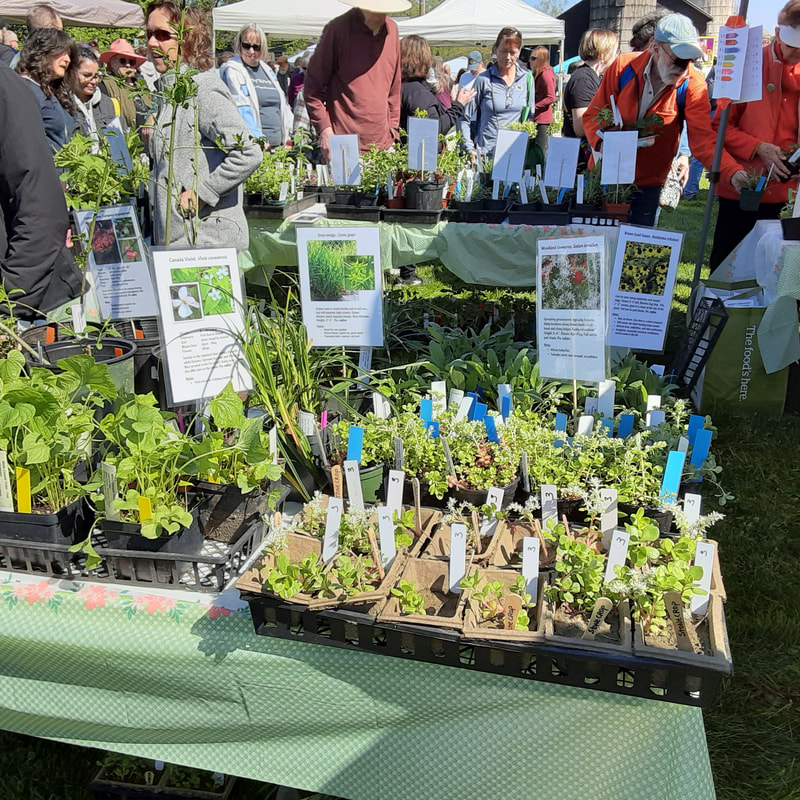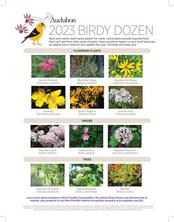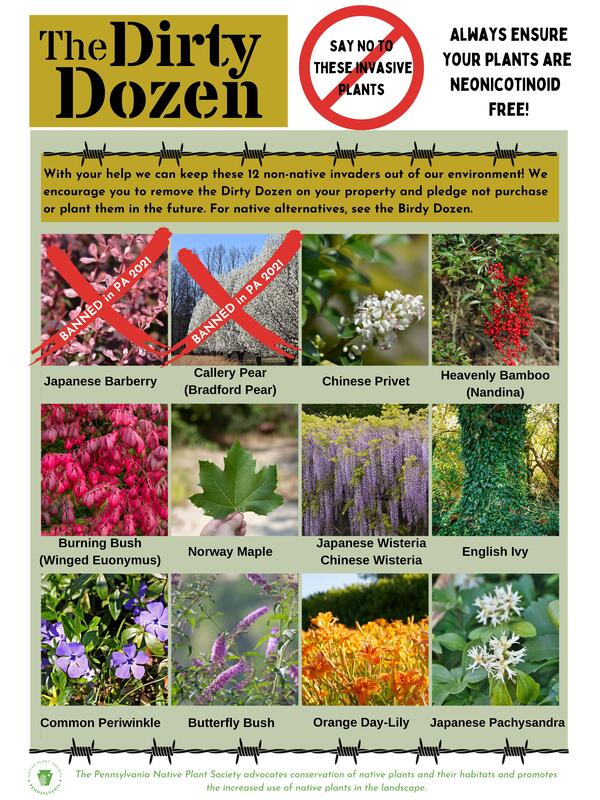|
HOUSE BILL 797 -
The time is now. We at PNPS are asking for you to support Pennsylvania House Bill 797, legislation mandating native plants be utilized in PennDot plantings across the Commonwealth. House Bill 797, which is currently under consideration in the PA House, would direct PennDOT to plant native trees, shrubs, flowers, and grasses along state-owned highways. Please sign the Action Alert to support the legislation, organized by the Chesapeake Bay Foundation. Also, please encourage your local legislators in the PA House to support this bill. It was scheduled to be voted on sometime in March but has not been voted on yet. Upcoming Events - Mark your calendars
September 14, 2024 - PNPS Annual Meeting, Shaver's Creek Nature Center. Speakers and details will be posted once finalized.
The Dirty Dozen vs the Birdy DozenAs you work on your landscaping, please remember the Dirty Dozen, a list of twelve invasive plants frequently found at nurseries and landscape retailers that should be avoided. The Dirty Dozen
Better yet, considering adding some of the Birdy Dozen to your gardens to attract birds. The Birdy Dozen Check more information on Invasive Plants and recommendations for alternatives on our Plant Information and Landscaping page. |
In Bloom:
Eastern Redbud
No tree heralds spring's arrival quite like the gorgeous eastern redbud tree (Cercis canadensis), although I think pinkbud is a more fitting name. Eastern redbud is beautiful as a specimen tree. But this tree is absolutely stunning when seen blooming en masse, often spotted in April and May along busy highways, country roads, and forest edges in the southern half of PA. The redbud tree attracts attention from the moment the dark pink buds form. When the blooms fully open, the entire tree is covered in clouds of flowers, varying from dark magenta, rosy pink, bright fuchsia, lavender pink, and sometimes white. Redbud is cauliflorous, so some flowers grow directly on the trunk or branches. Blooming while most trees are bare, the flowers provide nectar for hummingbirds and long-tongued bees and pollen for many insects. As the flowering ends, the large beautiful heart-shaped leaves make their appearance. The leaves are food for the larvae of the Henry's elfin butterfly. The leaves turn a pretty yellow in fall, and seedpods provide food for birds and small mammals. Although relatively short-lived (anywhere from 15 to 70 years), eastern redbud is a fast-growing tree easily grown from seed. The next time you see clouds of pink streaming past as you drive through the lower half of PA, make sure to admire the "pinkbud" trees putting on their spring show. You might want to make a trip to Pittsburgh, where I read the Western PA Conservancy led the Pittsburgh Redbud Project and planted thousands of redbud trees since 2016. The trees are so prolific that some refer to redbuds as the "Pittsburgh Cherry Blossom." Hmmm, may be time for another road trip! Article and photo courtesy of Karen Smith. What is a Native?A native plant is one that occurs naturally in a particular region, ecosystem, or habitat without direct or indirect human intervention. We consider the flora present at the time Europeans arrived in North America as the species native to the eastern United States. Native plants include all kinds of plants from mosses and ferns to wildflowers, shrubs, and trees.
Read more... Why Natives?
Because native plants are adapted to the growing conditions where you live, they are often easier to grow, and less susceptible to challenging conditions than non-native plants. Many Non-native plants are also invasive, and threaten out our native plant species.
Read More.... |
Get Involved!
|
Membership Dues and Donations
PNPS is committed to supporting programs and events advocating for the use of native plants. Money obtained from memberships and donations go to the following:
We accept donations and membership payments online and by check. Thank you for your support! Membership dues online - please click the Become a Member button to pay through Paypal or with a credit card. Membership by check - Click here for instructions
Donations online - please click the Donate button to pay through Paypal or credit card. For other options, click here. PNPS is a 501(c)3 non-profit organization. If you would like to learn more please email [email protected] Contact Us:For general inquires, email us at [email protected] Our mailing address is P.O. Box 807, Boalsburg PA 16827
|
Volunteer - Your help is needed!There are always opportunities to help, regardless of your level of expertise. Click the button to see what volunteer opportunities area available.
Social Media
Facebook Page: Find information on events and interesting articles on our Facebook page.
Facebook Forum: Join our Facebook forum to share photos, events and opportunities related to natives plants and our mission. Our group is closed and you must submit a request to join. We do this to help us keep out spam and maintain this group as a respectful forum for people interested in native plants. You must submit a request and answer 2 simple questions to join, even if you are added by a current member.
We are over 14,000 members strong and growing! |



